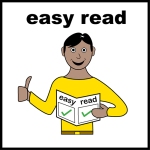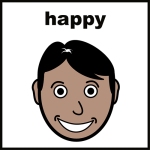 In this blog post I want to speak about something called ‘intimate citizenship’ and people with learning disabilities. This article is written in Easy Read, so that lots of people can read it. You can access this article as a PDF, here: Intimate Citizenship and Learning Disability
In this blog post I want to speak about something called ‘intimate citizenship’ and people with learning disabilities. This article is written in Easy Read, so that lots of people can read it. You can access this article as a PDF, here: Intimate Citizenship and Learning Disability
What is “intimate citizenship”?
 Intimacy, and being intimate, is about touch, love, affection, privacy, bodies, care and being close.
Intimacy, and being intimate, is about touch, love, affection, privacy, bodies, care and being close.
 Citizenship is about our rights and access to equality, fairness and justice.
Citizenship is about our rights and access to equality, fairness and justice.
 Intimate citizenship brings these together to refer to our rights and access to equality within our intimate lives – the spaces in our lives where we love and care for others, ourselves and our bodies.
Intimate citizenship brings these together to refer to our rights and access to equality within our intimate lives – the spaces in our lives where we love and care for others, ourselves and our bodies.
 Whether we are single, in a relationship, want to have a family, or be part of a family, we should have access to intimate rights which include things like who we love; where we live; and our sexual health.
Whether we are single, in a relationship, want to have a family, or be part of a family, we should have access to intimate rights which include things like who we love; where we live; and our sexual health.
 However, for people with learning disabilities intimate rights and citizenship can often be denied, ignored, or overlooked. This is wrong.
However, for people with learning disabilities intimate rights and citizenship can often be denied, ignored, or overlooked. This is wrong.
Why does intimate citizenship matter?
 For most people, intimacy is important to happiness and well-being. Many of us enjoy intimacy and closeness in our private and personal lives, whether it comes from friends, family members or romantic and/or sexual partners.
For most people, intimacy is important to happiness and well-being. Many of us enjoy intimacy and closeness in our private and personal lives, whether it comes from friends, family members or romantic and/or sexual partners.
 It matters because being with others feels nice, can be pleasurable and make us feel good about ourselves, and feel safe and secure in our lives.
It matters because being with others feels nice, can be pleasurable and make us feel good about ourselves, and feel safe and secure in our lives.
 We all have the right to have relationships with others and be supported to find and/or maintain our relationships if we need it.
We all have the right to have relationships with others and be supported to find and/or maintain our relationships if we need it.
 But, intimate citizenship also relates to our rights to say no to intimacy if we don’t want it, and our rights to not be sexually abused, raped or exploited. Women with learning disabilities experience greater rates of sexual violence than women without learning disabilities.
But, intimate citizenship also relates to our rights to say no to intimacy if we don’t want it, and our rights to not be sexually abused, raped or exploited. Women with learning disabilities experience greater rates of sexual violence than women without learning disabilities.
Our intimate citizenship can also include things like:
 Accessing contraception and sexual health care.
Accessing contraception and sexual health care.
 The right to parent and start a family.
The right to parent and start a family.
 Learning about consent (saying yes or no to a sexual act).
Learning about consent (saying yes or no to a sexual act).
 Receiving good quality sex education.
Receiving good quality sex education.
 Choosing what to wear and expressing ourselves with our bodies (e.g. tattoos and body piercings).
Choosing what to wear and expressing ourselves with our bodies (e.g. tattoos and body piercings).
 Where we live: who we want to make a home with.
Where we live: who we want to make a home with.
Researching intimate citizenship?
 In September 2015, researchers Katherine Runswick-Cole, Dan Goodley, Kirsty Liddiard, Jen Slater and Jodie Bradley and Vicky Farnsworth from Speak Up Self-Advocacy are going to Toronto, Canada, to speak with other researchers and self-advocates from all around the world about intimate citizenship.
In September 2015, researchers Katherine Runswick-Cole, Dan Goodley, Kirsty Liddiard, Jen Slater and Jodie Bradley and Vicky Farnsworth from Speak Up Self-Advocacy are going to Toronto, Canada, to speak with other researchers and self-advocates from all around the world about intimate citizenship.
 The aim of the trip is to think about how researchers and self-advocates can work together in future research to explore how people with learning disabilities can be better supported within their intimate lives.
The aim of the trip is to think about how researchers and self-advocates can work together in future research to explore how people with learning disabilities can be better supported within their intimate lives.
To learn more, check out some of these free Easy Read resources (click on the title or the picture):
 Talking about sex and relationships: the views of young people with learning disabilities.
Talking about sex and relationships: the views of young people with learning disabilities.
Written by Kirsty Liddiard, School of Education, University of Sheffield
Images by Easy on the i, NHS UK










